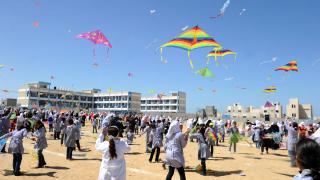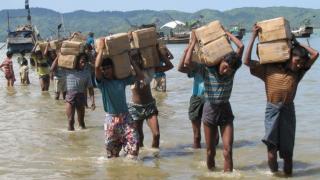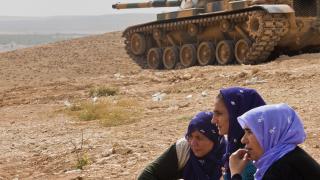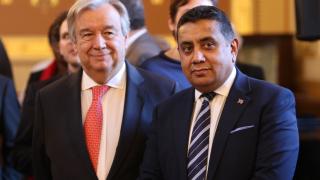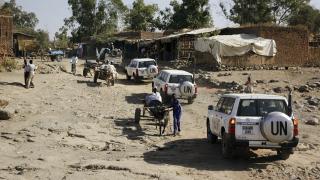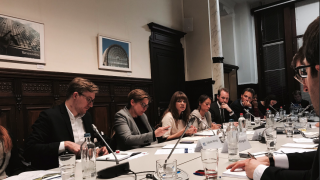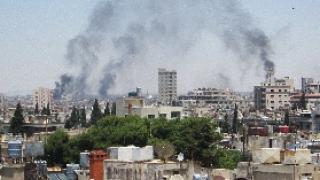
It emerged last week that UK pilots have been embedded in US-led air strikes against the Islamic State of Iraq and Levant (ISIL) in Syria since autumn last year. Secretary of State for Defence Michael Fallon insists that combating ISIL requires the UK to join its allies in targeting the group.
In August 2013, MPs voted against UK intervention in Syria in response to the use of chemical weapons against civilians. Parliamentary approval is not formally required for military action but in recent years governments have generally opted to put these decisions to a vote. As such, Parliament has authorised strikes against ISIL in Iraq. Following the Tunisia beach attack on 26 June, a vote on the extension of strikes to Syria is expected in the autumn.
Fallon has explained the involvement of UK pilots in US-led air strikes on the basis that ISIL’s command and control is based in northern Syria. “It is from there its weapons and fighters flow into Iraq”, said the defence minister. “It is from there that its global influence spreads and from where the direct threat to the UK comes.” He fell short, however, of explaining the political context in which this move would deliver results for UK security.
A 'Responsibility to Protect'
UNA-UK is concerned that the current political debate around military action in Syria does not recognise the complexity of the situation, particularly with regards to the UK’s wider commitment to the principle of the Responsibility to Protect (R2P). In 2005, all UN member states agreed that the international community has a responsibility to respond when governments were failing to protect their populations from mass atrocities – through assistance in the first instance or, if necessary, coercive measures, from sanctions to military action.
It is clear that ISIL provides the inspiration and, increasingly, practical support for terrorist activities that have the potential to threaten UK citizens. But the vast majority of ISIL’s victims are people who are currently in Syria and Iraq. At the same time, the Assad Government is continuing to perpetrate atrocities against its own populations.
UNA-UK believes that the UK’s approach to this situation is too closely bound to a narrow counter-terrorism strategy. The threat to our security environment goes much wider than that. Countering it requires a comprehensive political strategy that includes, where possible, the protection of civilian populations.
Click here to read UNA-UK's guide to the Responsibility to Protect
UNA-UK's recommendations
1. Encourage dialogue
First, the UK and its partners must do more to encourage dialogue, both in the region and between global powers. ISIL has benefitted from the power vacuum created by Syria’s civil war, as well from the weakened state of Iraq following western intervention. While military force has a role to play in protecting populations from atrocities, only politics can deliver a durable solution. That might mean some unattractive compromises over post-conflict arrangements with parties to the conflict and making plans to protect all parts of the population, including minorities and the Alawite community. The continuation of a brutal conflict is a worse option.
2. Protect civilians
Second, the UK must expand its response to protecting civilians, building on its substantial aid contribution by taking in more refugees and working with partners to achieve an effective EU relocation mechanism. There are some four million Syrian refugees, most of whom have fled to neighbouring states like Lebanon, which is hosting a quarter of them. At present, EU states have committed to taking in just 40,000 refugees. The UK used its opt-out to avoid participating in the scheme. UNA-UK's Chairman, Sir Jeremy Greenstock, said: 'The lack of a decent UK contribution to the refugee problem is not just morally negative, it undermines our overall security interests, as peoples in conflict areas turn to desperate solutions outside their territories.'
3. Introduce R2P into UK policy
Finally, the UK must seek to tackle the root causes of violence, including by setting out a clear strategy for implementing its responsibility to protect. As the situation in Iraq and Syria has shown, atrocity crimes are not only brutal, they can destabilise countries and their neighbours, ultimately posing security risks to the wider world. R2P provides a framework for action that is anchored in prevention and early response. The UK should make this an explicit priority in its next National Security Strategy and ensure that all departments – foreign, development and defence – are working together to develop a holistic, preventive approach. This is an essential part of reducing the current and future threats to the UK, which will only proliferate in the absence of a huge collective effort to sustain peace and prosperity.
Photo: Homs under renewed shelling. Copyright UN Photo/David Manyua 2012

